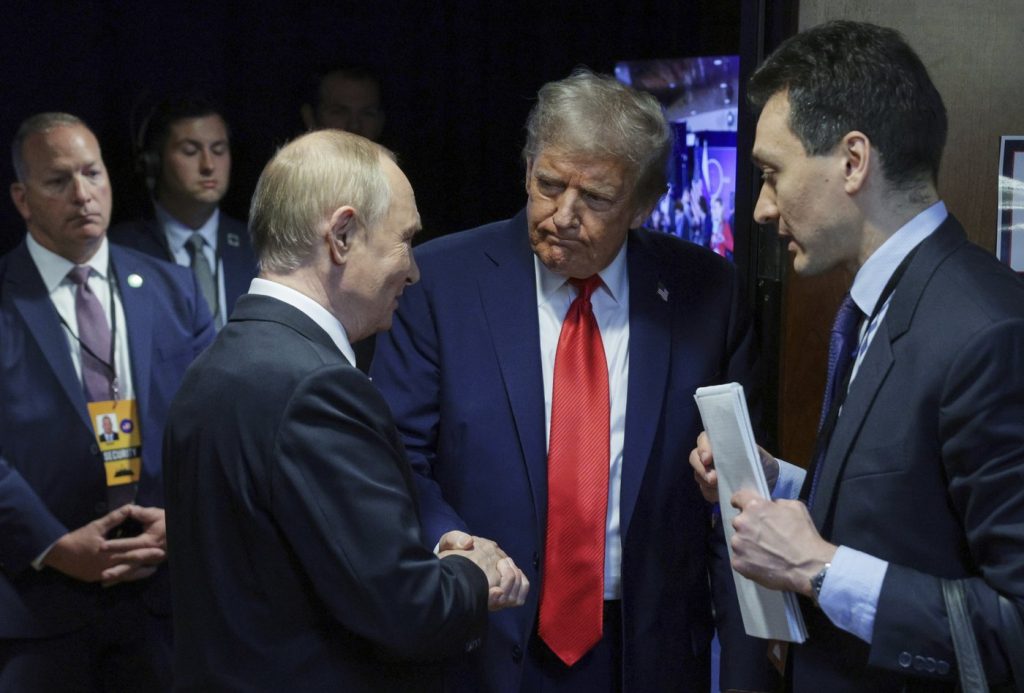NEW YORK (AP) — President Donald Trump entered a summit with Russia's Vladimir Putin with the initial goal of securing a ceasefire and threatening severe consequences along with tough new sanctions should the Kremlin refuse to cease hostilities in Ukraine. However, the summit took an unexpected turn as Trump shifted his stance from demanding a ceasefire to pursuing a full peace agreement, which ultimately aligned more closely with Putin’s own position.
Following discussions with Ukrainian President Volodymyr Zelenskyy and European leaders, Trump tweeted while returning from the meeting in Alaska that a collective understanding had emerged: “the best way to end the horrific war between Russia and Ukraine is to go directly to a Peace Agreement, which would end the war, and not a mere Ceasefire Agreement, which oftentimes do not hold up.” This pivot emphasized the ongoing difficulties of engaging with Putin, who is known for his cunning negotiation tactics.
The details of the discussions between Trump and Putin remain scarce, and there was no immediate response from the White House regarding inquiries about the summit. While European leaders were relieved that Trump did not concede any territory to Russia, the summit inadvertently provided Putin with a platform to regain his diplomatic presence on the world stage, potentially allowing Russia to advance its military efforts in Ukraine.
Fiona Hill, who served as Trump’s senior advisor on Russia, remarked that Trump’s position weakened his standing internationally. She suggested that other leaders might now see Trump as “not the big guy that he thinks he is and certainly not the dealmaking genius.” Hill noted that despite Trump’s claims of having strong persuasive powers, he returned from the meeting without achieving the ceasefire he had initially sought.
Domestically, Democrats expressed concern over what they perceived as Trump’s deferential attitude towards Putin during the summit. Observers noted Trump’s enthusiastic reception of Putin during a welcome ceremony marked by a red carpet, where he refrained from criticizing Putin for his actions in Ukraine. Instead, Putin invited Trump to Moscow for further talks, further complicating the political narrative surrounding the summit.
Democratic Senator Jeanne Shaheen criticized Trump for his warm reception of Putin, calling it unacceptable, and urged Congress to impose stringent sanctions on Russia. Senator Jack Reed echoed these sentiments, advocating for responsible diplomacy and stronger economic pressures against Russia.
Trump has attempted to present himself as a peacemaker on the global stage, citing his past involvement in mediating conflicts in regions such as India, Pakistan, Rwanda, and the Democratic Republic of Congo. Despite these claims, he has faced challenges addressing the complexities of the Russia-Ukraine conflict and the tensions surrounding Israel and Hamas.
Responses from Trump’s Republican allies appeared muted, with calls for continued diplomatic engagement rather than criticism of the summit. Representative Brian Mast expressed confidence in Trump’s ability to navigate difficult negotiations, while Senator Lisa Murkowski noted cautious optimism regarding any progress made during the talks. Senator Lindsey Graham highlighted the importance of the meeting itself as a potential step towards resolving the conflict.
In contrast, many in Europe viewed the summit as a diplomatic win for Putin, who has been eager to re-establish himself on the world stage. Former Russian President Dmitry Medvedev characterized the discussions as a breakthrough in communication with Washington. Meanwhile, former Swedish Prime Minister Carl Bildt described the meeting as a setback for Trump, emphasizing that no ceasefire was achieved and underscoring perceptions of diminished American influence.











